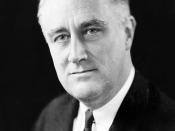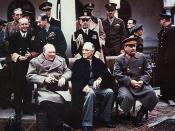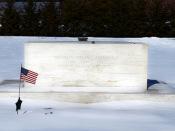Prior to the United States' entry into WWII, American president, Franklin D. Roosevelt, had taken actions that are known as an "undeclared war." An undeclared war can best be explained as taking every action possible to oppose a country at war, without actually firing any shots. As FDR said, an undeclared war is "everything short of war." Some of these actions include provoking a first shot and giving aid to other countries currently at war with the opposing country. As president, FDR has always been known to try to keep every side happy, and having an undeclared war was the best attempt to do this. Although it was known that it would be inevitable for the US to avoid war all together, an undeclared war put the US in the best position possible until it became time to enter.
At this point in time there were several key factors that forced FDR to have an undeclared war as opposed to a declared war.
The biggest reason, which is the same reason why this undeclared war dragged on for so long, was that FDR wanted approval from congress to go to war. Regardless of the fact that as president he could have bypassed this procedure, FDR wanted the war to be accepted by everyone. This became a problem because America was still in an isolationist mindset. After WWI, isolationists felt they lost all those men for nothing. Now the common belief was that European problems should stay in Europe. Aside from congressional approval, FDR also cared about what the general public believed. (After all, one of the things that got him reelected in 1940 was his campaign promising that the US would not enter into war.) Surveys and polls were frequently taken during this time regarding the issues abroad. Another main reason for the wait was that FDR refused to go to war unless the US was attacked first. FDR wanted America to look like the victim in the situation, who would be fighting for what is good and moral. The final reason why FDR prolonged the undeclared war came later on. Since the war was inevitable, the longer the wait to enter, the more time there was to build up and prepare the military.
When FDR said that undeclared war was "everything short of war", he meant it. The campaign first began with Japan. In July, FDR said that he was waiting for Japan to make an "overt step" to take action on them. Once Japan made that step by invading Indochina on July 24, the US imposed an oil embargo on them, and all Japanese assets in the US were frozen. The next step of the undeclared war was to focus on the main event, Europe. Early in the campaign FDR released Soviet funds in the US, which were roughly $40 million. At the same time the US said they "would not invoke the Neutrality Law against the Soviet Union." This was significant because the port of Vladivostok would remain open for US ships.
In the fall the need for US aid by the Soviets increased. Stalin had given the US a shopping list of war materials that were needed to keep them from falling. Among this list were aluminum, many anti-aircraft weapons, and rifles. Providing these goods to Russia would be a very provocative move to the Germans. FDR and Churchill came together and agreed that starting Oct 1, they would send 1800 aircrafts, tanks, aluminum, and 90,000 jeeps and lorries. FDR said that he would extend lend-lease to the Russians by giving them $1 billion of aid. The repayment would begin five years after the end of the war, interest free.
By July of 1941, FDR was going almost as far as he could without entering the war. He and Churchill made an agreement that would send marines to Iceland to aid the British soldiers already stationed there. Under the agreement, the marines would be under British command. Also, the British troops would eventually leave Iceland and the marines would take over in occupying it. Admiral Stark claimed that this was "practically an act of war." At this point in time FDR was just waiting for an excuse to enter into the war. He proclaimed, "He would wage war, but not declare it, and that he would become more and more provocative⦠He would look for an incident which would justify into opening hostilities."In September FDR took one of his biggest steps in moving the US in the direction of entering the war. He did so not just by taking action, but by getting the public to start backing non-isolationist ideas. On September 4 there was the Greer incident. While patrolling the waters around Iceland, the USS Greer trailed a U-boat for several hours. After a while the U-boat fired two torpedoes at the Greer but missed by a lot. The Greer exchanged fire but missed as well, and eventually the U-boat got away. When the news first got to FDR, he only heard that the U-boat fired at the Greer for no reason. Obviously the Greer was provoking the U-boat. Immediately FDR made several speeches that got the public to start backing the cause of going to war. As a result he also got provisions of the Neutrality Act that would allow all US ships to bear arms. He also stated that he would provide armed escorts for all shipping boats, whether they were American or not. As time went on FDR learned the whole story about the Greer incident, but kept it quite. He saw this as a good way to get the wheels in motion for entry to the war.
Under other circumstances, any of these actions would have caused German retaliation of some sort. The problem was that Germany had their hands full with the two front war. The other problem was that the conquering of the Soviet Union was not going as planned. Most people predicted the war to be over in 6-8 weeks, but once it began the Soviets showed great resilience. Because of Germany not being able to retaliate, the US was able to put themselves in a very good position. With the lend-lease aid, Russia would be able to hold out for much longer (Stalin said 3-4 years) and the US would be given time to make the transition of having a wartime economy. Since they were already making all of these new weapons for Britain and Russia, when the time came to start producing for themselves, there would be no problems. With all of the new time that was bought, the US was also given time to buildup and prepare its military. Because FDR was able to wait and not declare war, the US was put into the best possible position it could have been when it finally entered the war.
BibliographyKershaw, Ian. Fateful Choices. New York: Penguin Books, 2007





